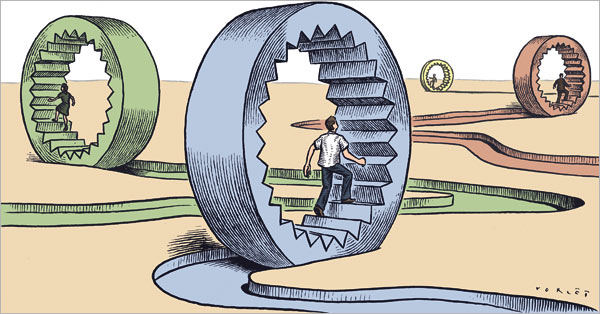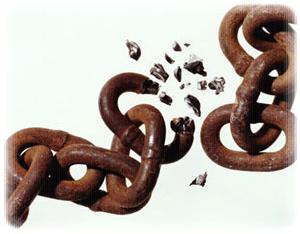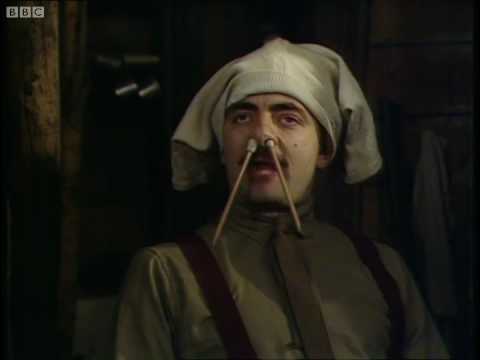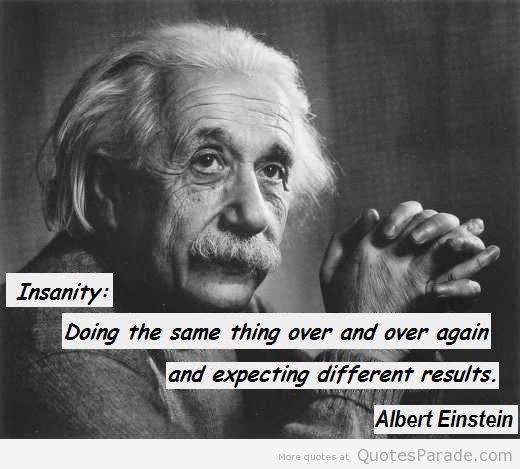The Folly of Familiarity
Life presents us with uncountable possibilities, even in the simplest of tasks or actions can be approached or done any number of ways. For any of the acts we do there are no prescribed or predefined ways of going about them. We are all unique and so each of us can and will do the same thing differently than others. We put what is referred to as our own stamp on things. And while we do not do things exactly the same way as anyone else would do it we are also capable of doing the same thing a number of different ways.
This diversity of expression, like the diversity of form we see throughout the Cosmos is one of the wonderful and indeed wondrous things about life. Yet as wonderful as it is, therein lies a trap for the unmindful. The trap that awaits us is that the more we do something, and like the outcome we believe our choice manifested the more likely we are to end up doing it the same way each time. That is to say we reduce all the wonderful options we have down to a few, then a couple and then one. This is a process that creates routines and we end up in various forms of ruts. Even when we don't set about to do this deliberately, it almost invariably happens.

"Habit, if not resisted, soon becomes necessity." St Augustine of Hippo
We humans tend to be creatures of habit and while routine is something that has its benefits, the benefits lie mostly in the process and not the act itself. For instance, if we are going to fix something we first need to understand what the problem is, we then examine it to determine what needs to be done to resolve it and then we set about doing just that. We can get creative within the process, we can even be creative in designing a new and more effective process but unless the problem is one we've encountered before, extremely simple or with little or no risk one wouldn't likely try to do something before knowing what the actual source of problem is first. What we want is a solution to our challenges or problems and not a solution looking for a problem. While this can be an interesting mental exercise it generally has little practical value. Also, doing it this way would be foolish as by taking this approach we could make matters worse or at the very least waste our time by trying solutions that are ineffective.
Having the occasional routine is not a bad thing, our problem is we tend to routinize just about everything. We have a routine when we get up, we have routines for our activities, we tend to eat the same foods, wear the same types of clothes, we walk, talk and react to people using the same routines, appreciate only certain kinds of music, television shows or activities and so on. In the process we reduce our unbelievably powerful minds to the lowest common denominator and sacrifice creativity, imagination and spontaneity for the drudgery and imagined safety and comfort of the familiar.
I suppose if one thinks that life should be about safety and comfort alone then routines may seem like a good thing, but there is also a trap in this. When things change we find ourselves stuck and more often than not unable to shift and we get left behind. A good example of this can be found by looking at what happened to the watch industry in the early 70's. The Swiss watchmakers had a huge monopoly on watch sales, but when one of their own developed the quartz crystal watch they dismissed it as a novelty. They felt secure in this and continued to focus on traditional wound watches while others took the quartz watches to market. Within a few years they had lost three quarters of their market shares to companies making cheaper quartz watches and many went out of business.
Some of the habits we take on are because we have found that a certain way of doing things to be of benefit to us; however, many more are due to our reaction to our experiences. When we encounter things we do not like or something hurts or bothers us we tend to avoid it rather than deal with it. We often do so in no small part because we neither realize nor accept that what happens to us is due to the way we and not others are. If we realized this we would be more inclined to address what hurts or bothers us. Instead we put it off or ignore it as if by doing so it will miraculously go away.
We are not going to get out of our ruts nor even avoid the rut of creating more without conscious effort. Some of the ruts we have are big ones and will not move easily. They are the ones rooted far in our past. They have become buried by years of experiences and our reactions to them. To change them requires significant effort and dedication assuming one has the wherewithal to recognize them in the first place. It also requires we have the mentality that change is not a bad thing. This is something we can train our mind to accept so that we can take on some of our bigger challenges.
Our routines are often hidden from us, mostly because we do not pay attention to the now. Instead we more or less go on the momentum created by our past. We create ruts not because of the actions we do, rather due to the thoughts that gave rise to them, though this has not always been the case. When we are young our act are not led by our past like they are for adults. We do things for no reason other than the joy of doing them as we are just tasting life, hence everything is new and an adventure. We react to our adventures and in the process build our mental house. this changes once we have a mental house. We do not teach children mindfulness and as a result we never even notice the gradual demise of our curiosity and inquisitiveness. Over time this leads to a strong tendency to stay inside its the familiar confines of what we have experienced before and feel safe doing.
This occurs because when we like the result of something, at least in our estimation, our mind notices it and that doing otherwise yields the opposite result. Unless we are are conscious of this, which requires mindfulness, the long term result is we tend to favour the former over the latter. The result of this process is that we give up our "free will" as it is our past that dictates our choices rather than the present. In order to exercise free will one must be clear of the encumbrances of the past. It should should be a guide for us and not a dictator, though this is what it becomes. This begs the question, "what can I do about my ruts?"
"It is here that the warrior has an advantage over the average man. An average man cares that things are either true or false, but a warrior doesn't. An average man proceeds in a specific way with things that he knows are true, and in a different way with things that he knows are not true. If things are said to be true, he acts and believes in what he does. But if things are said to be untrue, he doesn't care to act, or he doesn't believe in what he does. A warrior, on the other hand, acts in both instances." (1)
The above passage from one of Carlos Castaneda's early books contains not just a clue to the answer, it contains a guide to it. Change the word true and false to comfortable and uncomfortable and will we have your answer. Our folly of gravitating towards the familiar and comfortable starts out innocent enough. We think we are in control of it but by continuing to do so it becomes the master rather than the servant. We do not call on the familiar because it is useful at the time, we do so because it becomes all that we know. We can break this pattern by learning to listen to our lives; however, doing this can also be a challenge. Why? Simply because once we are stuck in a rut seeing or imagining another way of doing things becomes harder. You can almost liken it to "unknown unknowns"

In the above passage is the sentence " If things are said to be true, he acts and believes in what he does. But if things are said to be untrue, he doesn't care to act, or he doesn't believe in what he does. A warrior, on the other hand, acts in both instances." Consider it carefully. What it is saying is that we don't act on what is false or as I mentioned above unfamiliar or even undesirable.
Some of the ruts we have created for ourselves are enormous and the burden of the past so overbearing that changing them can dramatically alter ones life. Even when we have an inkling about being in such a rut the magnitude of the impact of changing it can deter one from not only trying to do so, but also from even wanting to in the first place. So, what is one to do? Well, this is where training the mind comes into play.
"Remember this point - space, set in motion, flows for ever. Thus supposing, metaphorically speaking, you move your pen across the paper one inch, that movement would give rise to a current in space which would flow in its positive form in one aspect of the movement, and return in its negative form in its other aspect. That would remain, and whosoever could discern that movement in space, could discern the action that gave rise to it. This is the basis of memory and this is the reason it is easier to repeat a movement which has been performed before and the more often it is performed the easier is the repetition, because the movement of space is cumulative and will avail to carry the movement in its current. You will find this explains much." (2)
The above passage speaks to how we create ruts. We create a rut by repeating an action. The more we repeat it the deeper the rut gets. Creating ruts is not the issue as it can be extremely valuable to do so. For instance, if I had to think about every drum stroke or foot movement and coordinating them I couldn't play the drums well. This is why I practice, namely so that when I play them I don't have to think about how to play them and simply express myself using what I have learned without needing to think about it. This would be an example of a rut that serves us, though one still needs to be cautious that they are not also become reliant on playing the same way all the time.
A rut or deeply ingrained habit becomes a problem as they take away other options away from us. However, as not all routines or habits are a problem we can take advantage of our ability to create them to begin to re-train our minds so we can deal even with bigger ones? At the same time we should recognize that our lives develop a cadence, which includes the combined 'rhythm of our ruts'. When our habits are limiting ones the rhythm is wobbly though we become accustomed to it and likely don't notice it or the struggles and even suffering that arises from it. Further, changing or removing a habit with disrupt our rhythm.
The more ingrained the habit is the harder it is to even choose to end let alone do so primarily due to fear. Also, changing habits tends to disrupt the 'rhythm' we've become accustomed to. The more deeply ingrained it is the greater the disruption, which we will likely view as painful and chaotic. Hence we must prepare ourselves to deal with the changes that result from doing so. However, we need not let fear and anxiety of change deter us. Instead, we should consider starting with habits that, when disrupted, are not likely to cause any big issues. That is to say we take on small ones first.
This approach has two significant benefits. The first should be obvious, namely that we by working with small ruts our resistance to and fear of the unfamiliar is lower. Second doing so trains our minds that we want to and can disrupt a habit and get out of our them. What we are doing by this is actually creating a new rut, but one that serves us rather than the other way around. To do this we simply make a conscious effort to do some things differently and are persistent in doing so. Being as mindful as possible is huge help as many of habits go unnoticed.
Doing things differently can be as simple as taking a different route to work, doing something we have always done one way some other way or even doing something we have come to dislike. Other examples would be picking clothes we normally might not wear, or trying foods we've never had, or if we have a tendency to be home bound to go for a walk for no particular reason at all. This is another aspect of the rut trap. When we are young we don't have to have a reason to do something, we just do it. As we get older this reverses, that is we don't do something unless we have a reason to. And remember, our reasons are based on the past, hence so long as we follow this path we are trapped by our history. Also, as we work through and past our ruts/habits we have to be mindful to not create new limiting ones.

When we begin to do things differently we naturally have different experiences. If we embrace it and do not concern ourselves with how we might appear or what others might think we can also reconnect with the pure joy of being we had as children. Where there was one option there are are now at least two if not more. The more we do it the more possibilities that appear and the more our spirit shines through. This is living rather than existing for we truly only exist in the moment. The wants, needs and desires we have are mostly those of mind and along with the past and the future are part of the illusion.
After we have done something different we can look back and both realize and acknowledge that not only are we still safe, the world did not end, in fact it got bigger! Acknowledgement is important for we want to update that we are not as staid or rigid as we were and that we can challenge and surmount our ruts.
The key in this is to not just do it occasionally, do it often and again for no reason at all. Doing this has an additional benefit, namely that when we choose to do something new we may notice that we have thoughts of why we did not want to. We may also notice our feelings about it. When we first begin to disrupt some of our ruts the thoughts we have are generally vague, in that we may not be able to "hear" the individual thoughts themselves. It is akin to a nameless fear. This is primarily because we have forgotten why we allowed the rut to form in the first place. It is far more likely we are aware of our feelings, ones that have us being reluctant to do something we normally would not do. For this reason we start small, as the fear factor is lower and we are less inclined to not just avoid it but also less fearful of the reasons why we have in the past.
For
Though my ears be dull
And senses
Not wholly within
Would run away with me
Still I shall turn them
Turn them away
Away
But not without
And small success
Surely following closely
Will be quick
To sense opportunity
Whisper to me
The above excerpt is from the poem, Whisper to Me (3), and it relates directly to what I am referring. In terms of dealing with ruts, it suggests that by turning our attention to our reactions we can start to unravel our minds and can more clearly see the ruts we have created. Our challenges do not lie without, likewise the answers or solutions to them are not without, they are within. Of course we have to want to get out of our ruts, which is why finding the desire to do is often our biggest challenge. Considering how restrictive having so many ruts can be, starting small and working up to stronger and deeper ruts helps us to develop the confidence to take on bigger ones.
One does need to be mindful that some of what appear to small ruts will be tied to bigger ones, but that should not stop us from doing so otherwise we will likely remain trapped by our ruts. If we want to grow, to be freer, more conscious and aware then we have to be willing to change because without change there is no growth. We just need to pay attention to our reactions so as to notice if we pulling out a small single weed or ripping up the whole garden.
Doing things differently is one way of helping us see the illusion our mind creates for us, which can help us break the hold it has over us. If we take it as an adventure rather than as a problem we are less likely to be resistant to trying new things. Not doing so leaves us trapped in the folly of familiarity and stuck in the illusion it creates.

© 2013 Allan Beveridge
Last updated October 11, 2018
References (*- denotes essays only available to site members of TheTwinPowers.com):
- Carlos Castenada, Journey to Ixtlan: Lessons of Don Juan, Simon and Schuster, 1972
- Dion Fortune, The Cosmic Doctrine, Boston, MA, Red Wheel/Weiser, LLC
- Whisper to Me

